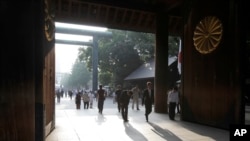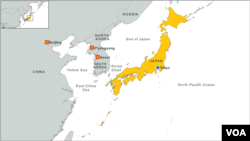BEIJING —
Officials in Beijing summoned the Japanese ambassador Thursday after members of Japan’s Cabinet took part in a controversial annual ceremony memorializing Japan’s war dead.
China issued a strong complaint from its Foreign Ministry and summoned Japan’s ambassador Thursday after two Japanese politicians visited a Tokyo shrine to commemorate Japan’s war dead. China’s Foreign Ministry said the shrine visit “seriously” harms the feelings of the Chinese people and other Asian countries.
In addition to the two Cabinet ministers, about 90 Japanese lawmakers visited the shrine. Japanese Prime Minister Shinzo Abe elected not to visit Thursday, but sent an offering through an aid.
“I asked my special aide to make the offering on my behalf with a feeling of gratitude and respect for those who fought and gave their precious lives for their country," he said.
Abe instead participated in a government-sponsored secular ceremony, where he said he hoped Japan reflected on history and did not repeat the misery of war. However, unlike his predecessors, he did not express remorse over Japan’s wartime aggression.
The Yasukuni shrine is dedicated to Japan’s 2.5 million war dead, including convicted war criminals. Japan’s neighbors say the Shinto shrine is a symbol of atrocities committed by Tokyo during World War II, and annual visits by Japanese officials are routinely condemned in China, Korea and Taiwan.
China’s Global Times newspaper stated that in recent years “Tokyo has slipped further to the right under the hawkish Abe administration.” Other media noted recent surveys indicating that more than 90 percent of Japanese and Chinese have an unfavorable view of each other.
Xiaohe Cheng is a Professor of International Relations at Renmin University. He said many in China expected Japan to change its pacifist constitution and rise again as a military power.
“The normal statehood from a Chinese perspective carries very important meanings that Japan will revise its peace constitution [sic] and will expand its military and military forces and also try to gain weapons, including aircraft carriers and possibly nuclear weapons,” he said.
Thursday’s shrine visit also angered South Korea, where President Park Geun-Hye indicated many Koreans believe Tokyo has not fully apologized or accounted for its wartime behavior.
She said Japan was an important neighbor for peace and prosperity in Northeast Asia. However, the current situation surrounding the issue of past history darkens the future. President Park said it was difficult to build trust towards the future if one did not have courage to look squarely on the past and attitude to consider pain of the opposite party.
As part of Korea’s own ceremonies marking its anniversary of liberation from Japanese colonial rule, authorities held a traditional Korean martial arts competition on an island claimed by both Japan and South Korea.
China issued a strong complaint from its Foreign Ministry and summoned Japan’s ambassador Thursday after two Japanese politicians visited a Tokyo shrine to commemorate Japan’s war dead. China’s Foreign Ministry said the shrine visit “seriously” harms the feelings of the Chinese people and other Asian countries.
In addition to the two Cabinet ministers, about 90 Japanese lawmakers visited the shrine. Japanese Prime Minister Shinzo Abe elected not to visit Thursday, but sent an offering through an aid.
“I asked my special aide to make the offering on my behalf with a feeling of gratitude and respect for those who fought and gave their precious lives for their country," he said.
Abe instead participated in a government-sponsored secular ceremony, where he said he hoped Japan reflected on history and did not repeat the misery of war. However, unlike his predecessors, he did not express remorse over Japan’s wartime aggression.
The Yasukuni shrine is dedicated to Japan’s 2.5 million war dead, including convicted war criminals. Japan’s neighbors say the Shinto shrine is a symbol of atrocities committed by Tokyo during World War II, and annual visits by Japanese officials are routinely condemned in China, Korea and Taiwan.
China’s Global Times newspaper stated that in recent years “Tokyo has slipped further to the right under the hawkish Abe administration.” Other media noted recent surveys indicating that more than 90 percent of Japanese and Chinese have an unfavorable view of each other.
Xiaohe Cheng is a Professor of International Relations at Renmin University. He said many in China expected Japan to change its pacifist constitution and rise again as a military power.
“The normal statehood from a Chinese perspective carries very important meanings that Japan will revise its peace constitution [sic] and will expand its military and military forces and also try to gain weapons, including aircraft carriers and possibly nuclear weapons,” he said.
Thursday’s shrine visit also angered South Korea, where President Park Geun-Hye indicated many Koreans believe Tokyo has not fully apologized or accounted for its wartime behavior.
She said Japan was an important neighbor for peace and prosperity in Northeast Asia. However, the current situation surrounding the issue of past history darkens the future. President Park said it was difficult to build trust towards the future if one did not have courage to look squarely on the past and attitude to consider pain of the opposite party.
As part of Korea’s own ceremonies marking its anniversary of liberation from Japanese colonial rule, authorities held a traditional Korean martial arts competition on an island claimed by both Japan and South Korea.








